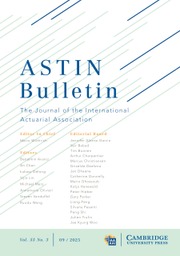Article contents
The Solvency Margin in Non-Life Insurance Companies
Published online by Cambridge University Press: 29 August 2014
Extract
Much attention has been paid in the last ten years to the necessary solvency margin especially as influenced by risk theory considerations. In these calculations, by which the solvency margin is determined in such a way that the probability of ruin remains under a specified norm, such factors as type of insurance, size of portfolio, reinsurance etc. play an essential role.
In these calculations, based on pure risk theory, there is thus no attention paid to risks in the investment field, in the area of costs, etc. Yet one must not forget that the solvency margin must also act as a buffer against these uncertainties, in other words the solvency margin must be large enough to cover all risks to which the concern is liable, within stipulated limits of certainty.
One drawback of a pure risk theoretical approach, as interpreted above, is that the bases of the risk theory are often difficult to translate into practical terms, and furthermore will differ from company to company. The latter is also the case with the size of portfolio, reinsurance, etc. However, if this could all be translated into practical terms in the right way, the results would upset relations between competitors, so that it seems natural to make the required solvency margin the same for all companies.
Seen in this light Campagne's approach is of great importance—already in 1948 he realized that a scientific basis for the size of the solvency margin was necessary. He confined himself to the life insurance industry, and based his calculations on the idea that the total results of the companies working in a country should be such that, ceteris paribus, the chance of bankruptcy remains below a stipulated norm.
- Type
- Research Article
- Information
- Copyright
- Copyright © International Actuarial Association 1980
References
1 C. Campagne: Contribution to the method of calculating the stabilization reserve in life assurance business, Gedenkboek Verzekeringshamer 1923-1948, 1948, 338 ff.Google Scholar
2 O.E.C.D., 11.3.1961.
3 The application of the Weibull distribution was brought to our attention by P. ter Berg, staff member of the Bureau voor Statistiek en Onderzoek of the Verbond van Verzekeraars in Nederland.
- 12
- Cited by


